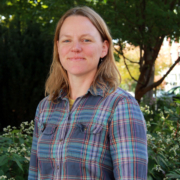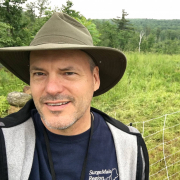The National Center for Appropriate Technology (NCAT) has launched its Regenerator’s Atlas of America, an interactive storytelling map connecting farmers, ranchers, and land managers who are taking steps to catch and hold more water in the soil. The Regenerator’s Atlas of America is part of NCAT’s Soil for Water project.
“From Maine to Minnesota, Texas to Idaho, the Regenerator’s Atlas of America is sharing the stories of farmers and ranchers who are finding ways to catch and hold more water in the soils, making their businesses more resilient to drought, erosion, and extreme weather,” NCAT Executive Director Steve Thompson said. “The Regenerator’s Atlas of America is creating a virtual gathering place and information-sharing platform for the growing number of agricultural producers who know that soil health is key to a strong business.”
NCAT’s Soil for Water project is about connecting producers with each other to share land management practices that improve soil health, catch more water in soil, reduce erosion, sustain diverse plant and animal life, and filter out pollutants, all while improving the profitability of their businesses.
Doug Garrison, owner of DS Family Farm near Lincoln, Nebraska is among the nearly 200 farmers who have joined the free and voluntary Soil for Water network, and he’s also added his place to the Regenerator’s Atlas of America. For 25 years, Garrison has been practicing regenerative grazing and wants to connect with other ranchers who are trying similar methods.
“My main interest in Soil for Water is to learn from others who are practicing regenerative ag in their specific context. We like to see what others are doing, think about what they are doing and see what their results are,” Garrison said. “Then, we may take some of their ideas or techniques and adapt it to our farm context and try it. We look for both similar and opposite techniques from what we are doing. You never know where you might find the next breakthrough idea for your operation.”
Unhealthy soil doesn’t absorb much water. Healthy soil acts like a sponge, capable of holding hundreds of thousands of gallons of water in an acre. Climate trends across much of the U.S. indicate longer, hotter drought periods punctuated by storms that often are more severe, according to a 2021 USDA report. Regenerative farming practices enable the soil to capture rainfall that otherwise might disappear as runoff. Economically, these practices can increase crop and forage production, drought resilience, access to lucrative new markets, and therefore profitability. Environmentally, they can improve soil health and biodiversity.
The Regenerator’s Atlas of America joins the Soil for Water Forum as another way farmers and ranchers can connect and learn from one another.
To learn more about the newly expanded Soil for Water project, add your pin to the Regenerator’s Atlas or chat at the Forum visit SOILFORWATER.ORG.
-30-
THE NATIONAL CENTER FOR APPROPRIATE TECHNOLOGY has been helping people build resilient communities through local and sustainable solutions that reduce poverty, strengthen self-reliance, and protect natural resources since 1976. Headquartered in Butte, Montana, NCAT has field offices in Arkansas, California, Colorado, Idaho, Kentucky, Mississippi, Montana, New Hampshire, Pennsylvania, and Texas. Learn more and become a friend of NCAT at NCAT.ORG.

 Nina Prater has been with the National Center for Appropriate Technology (NCAT) since 2016 as a Soil Specialist and Outreach Coordinator in the Southeast Regional Office. She strives to help farmers understand soils as a living entity so that they are able to farm profitably and build healthy soils for long-term success. Nina also works closely with the Gulf States Regional Office staff to coordinate outreach efforts in that region. Nina served as an Energy Corps member in 2013 and worked for her local conservation district for 2.5 years before joining NCAT. Nina and her husband Jeremy own and operate a small sustainable livestock operation in the Ozarks hills of Arkansas, where they raise meat goats, cattle, hogs, and poultry. They utilize adaptive grazing methods to build soil health in their pastures.
Nina Prater has been with the National Center for Appropriate Technology (NCAT) since 2016 as a Soil Specialist and Outreach Coordinator in the Southeast Regional Office. She strives to help farmers understand soils as a living entity so that they are able to farm profitably and build healthy soils for long-term success. Nina also works closely with the Gulf States Regional Office staff to coordinate outreach efforts in that region. Nina served as an Energy Corps member in 2013 and worked for her local conservation district for 2.5 years before joining NCAT. Nina and her husband Jeremy own and operate a small sustainable livestock operation in the Ozarks hills of Arkansas, where they raise meat goats, cattle, hogs, and poultry. They utilize adaptive grazing methods to build soil health in their pastures. Lee Rinehart is a graduate of Texas A&M University, where he studied animal science and agricultural education. He currently works as an agriculture specialist in the National Center for Appropriate Technology’s Northeast Regional Office, where he focuses on pasture and rangeland ecology and grazing systems. He has served as county Extension agent in Texas and Montana, organic farm educator in Pennsylvania, and cattle ranch manager in central Texas. His specialty is developing grazing plans and assisting producers in using animals to renovate pastureland. Lee is a Chief Petty Officer in the Navy Reserve and spends his free time biking, sailing, and renovating his 1925 Cape Cod house in Northeast Pennsylvania.
Lee Rinehart is a graduate of Texas A&M University, where he studied animal science and agricultural education. He currently works as an agriculture specialist in the National Center for Appropriate Technology’s Northeast Regional Office, where he focuses on pasture and rangeland ecology and grazing systems. He has served as county Extension agent in Texas and Montana, organic farm educator in Pennsylvania, and cattle ranch manager in central Texas. His specialty is developing grazing plans and assisting producers in using animals to renovate pastureland. Lee is a Chief Petty Officer in the Navy Reserve and spends his free time biking, sailing, and renovating his 1925 Cape Cod house in Northeast Pennsylvania.